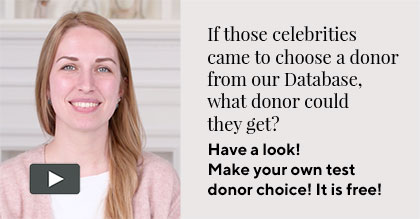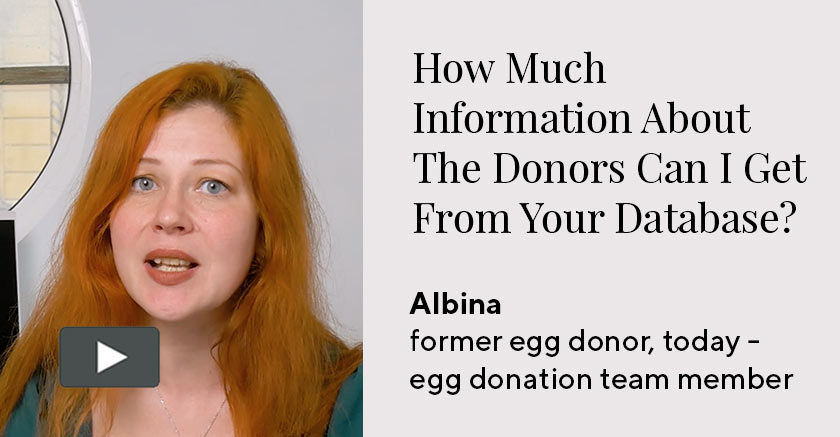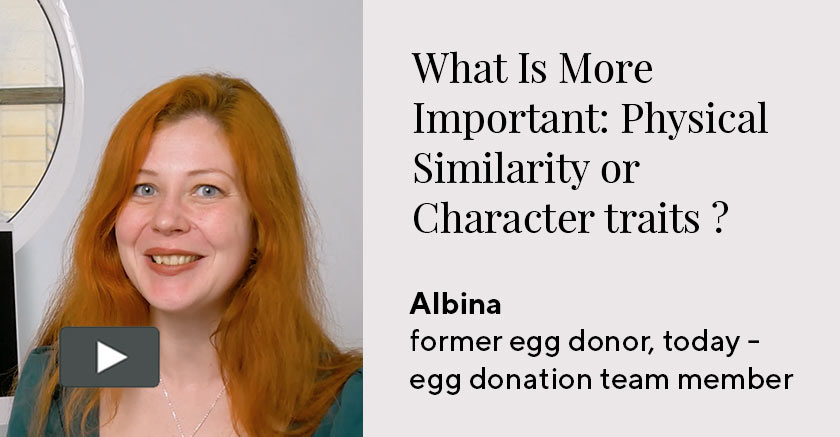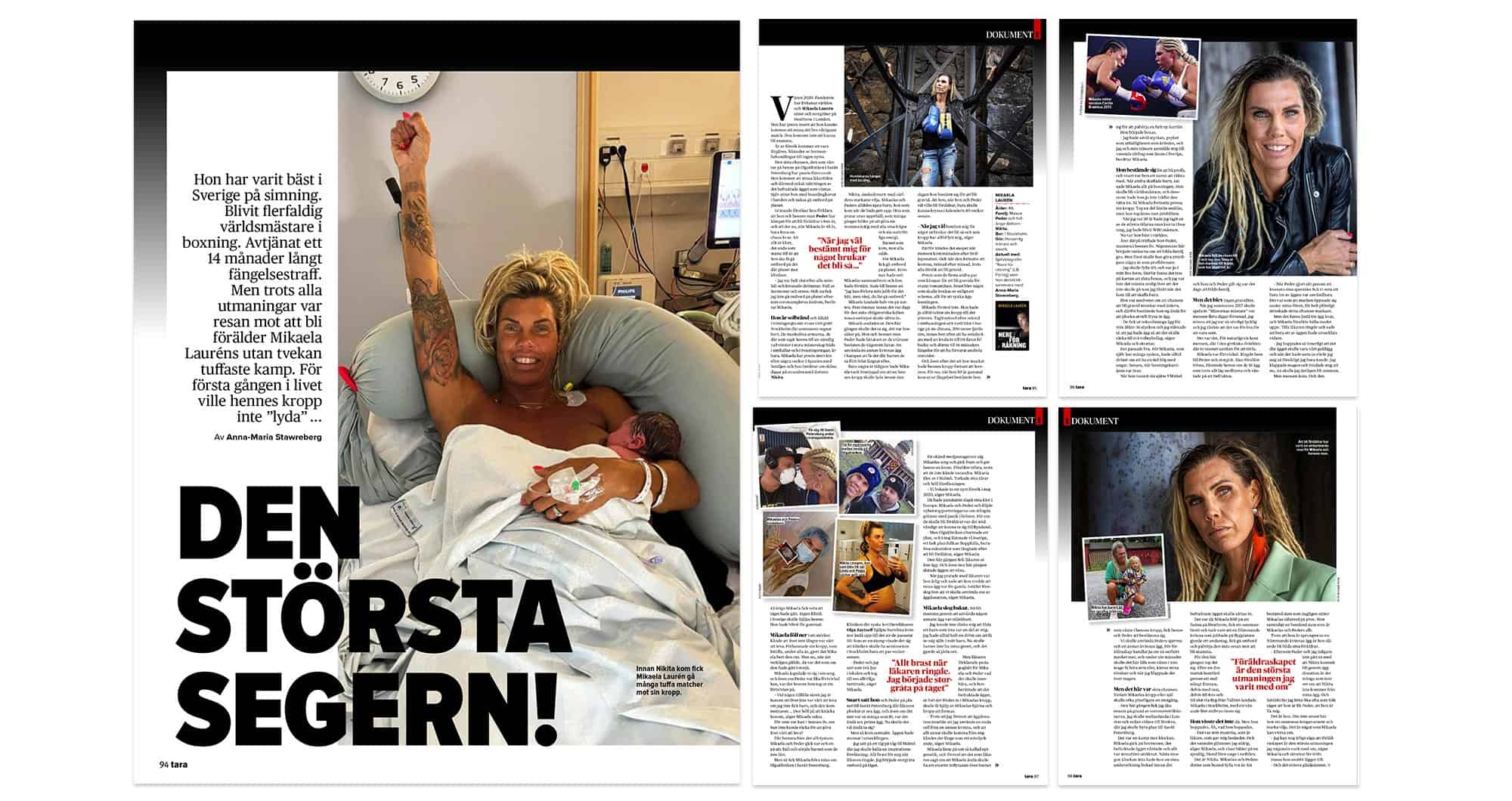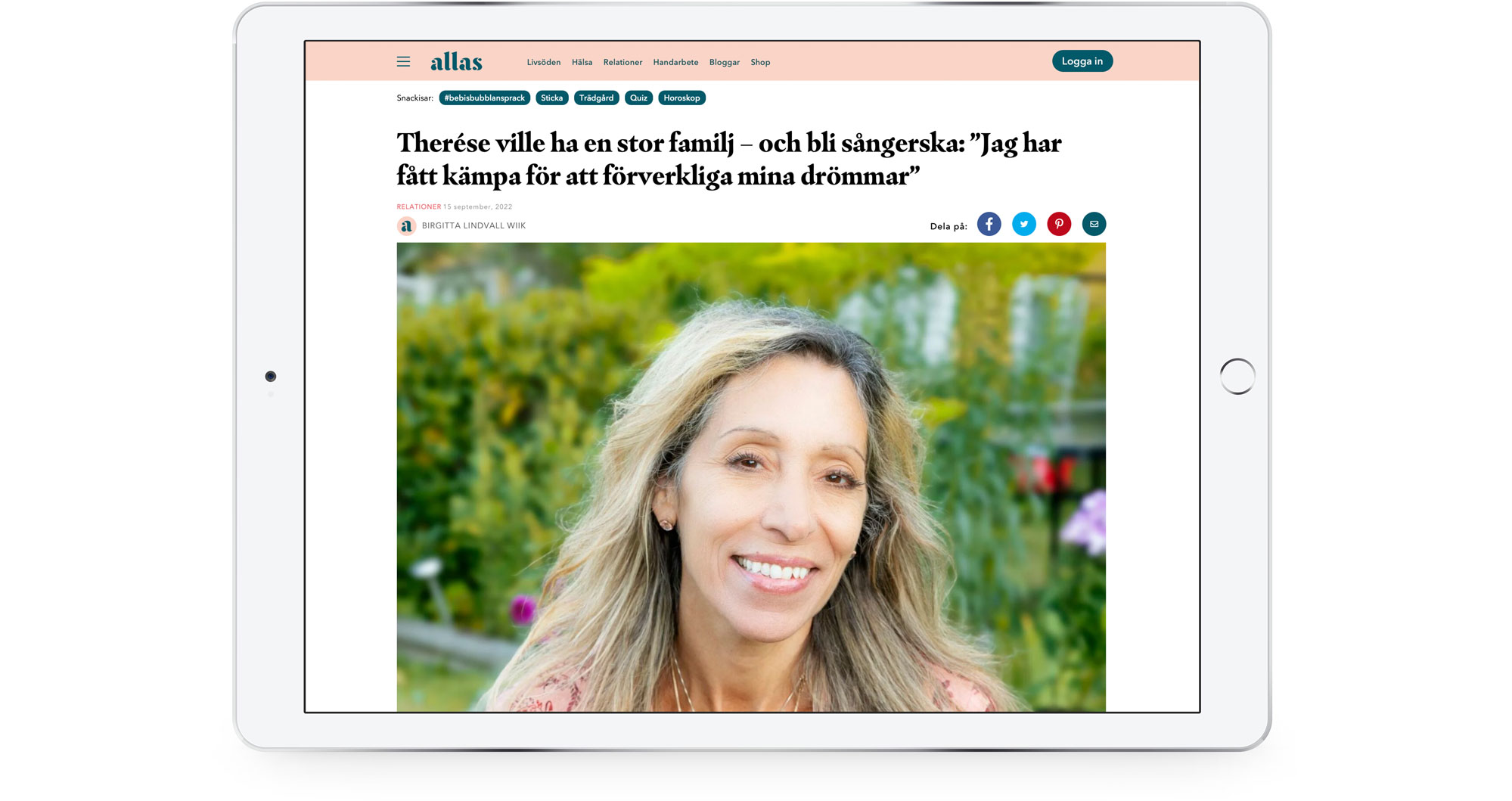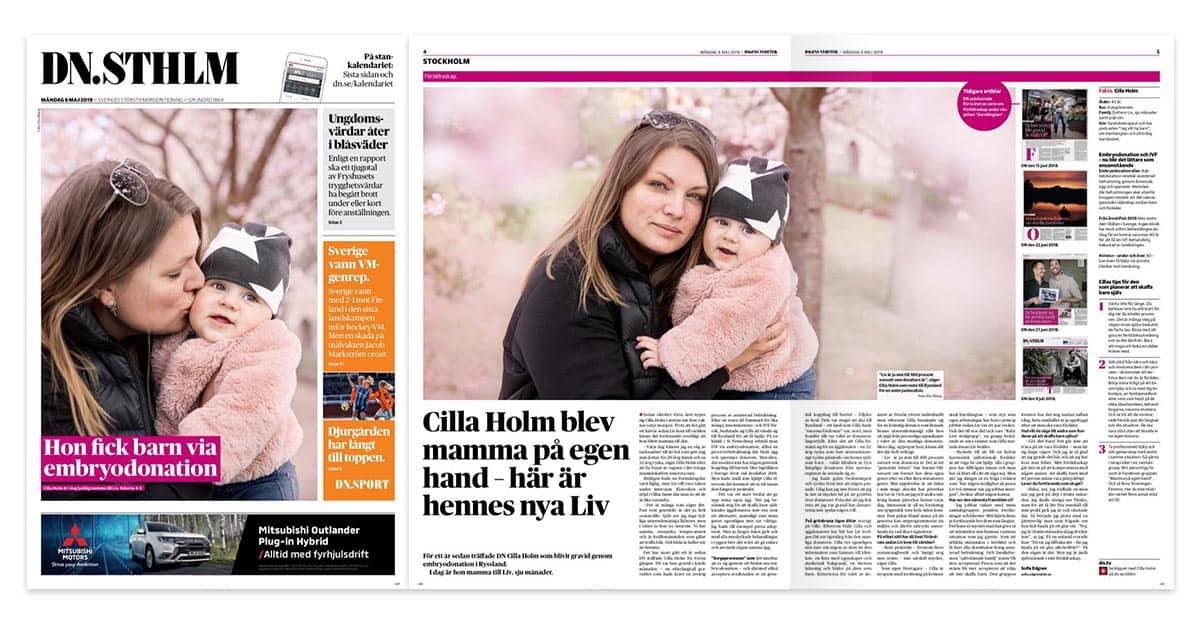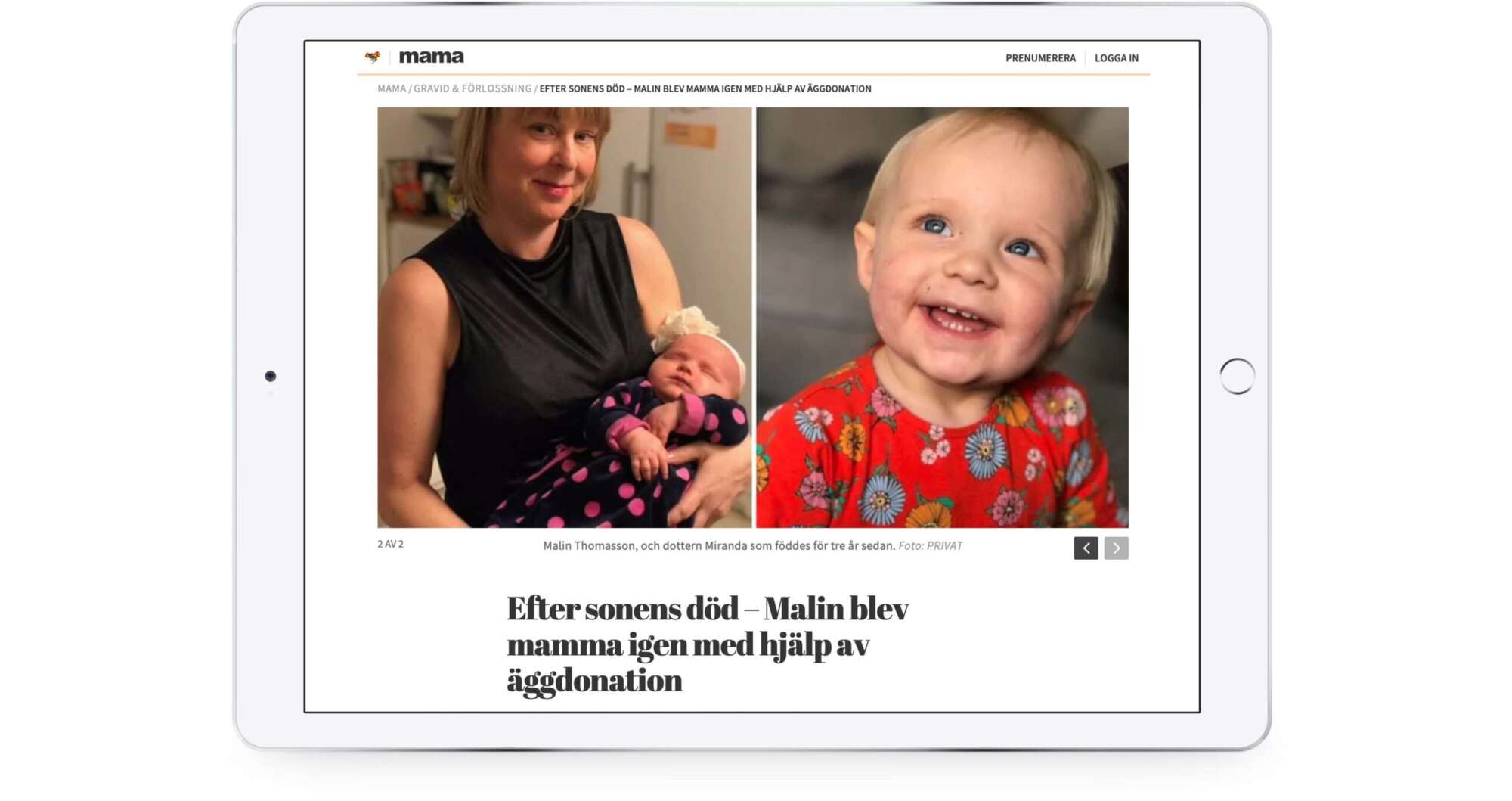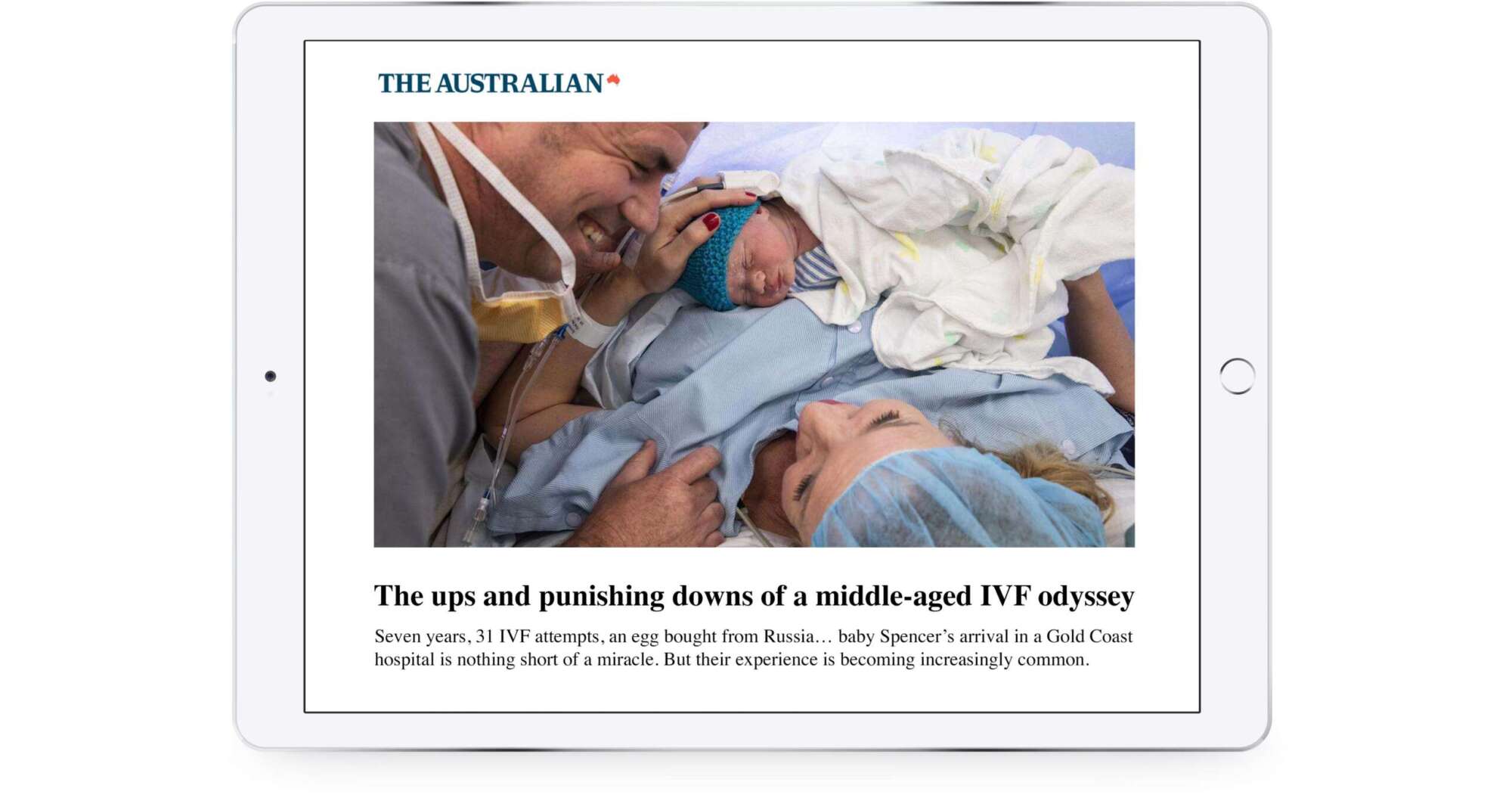”As soon as you are pregnant, you are a VIP.”
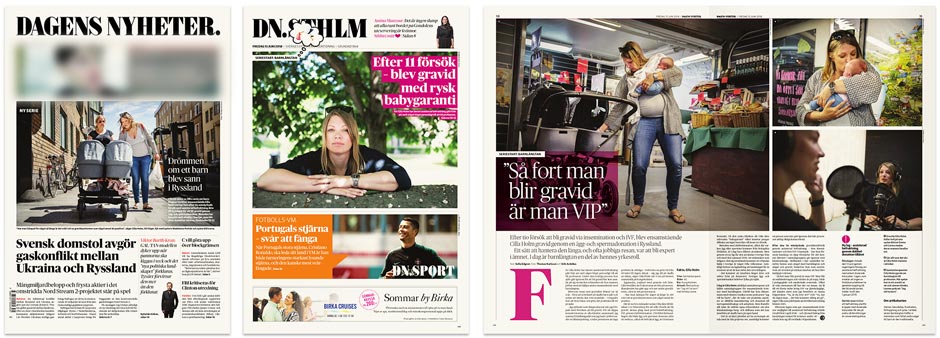
"Dagens Nyheter", Sweden. 15 June 2018 Text: Sofia Edgren, Photo: Thomas Karlsson and Erik Ardelius
After 11 attempts to become pregnant with insemination and IVF, single Cilla Holm became pregnant with egg and sperm donation in Russia.
One way of dealing with the long and often challenging journey was to become an expert at the topic. Today childlessness is part of her profession.
Facts. Cilla Holm
Profession: Therapist.
Age: 42
Lives: Kungsholmen, Stockholm
Relevant because of: The podcast ”I want children” with Annika Leone.
For Cilla Holm the topic of in vitro fertilisation has gone from being something very personal to becoming a profession. During the three-year prosess, she went through to become pregnant, she has gathered so much experience that she now works, helping other single women with their childwish.
As the journey towards pregnancy can be difficult — first to make the decision to get children on your own and then the practical part of it, she was forced to change focus and make the practical part a project.
I worked as a film producer when I started my attempts to become pregnant. To avoid the emotional consequences I took the same approach as I had to my work during shooting a film: With the attitude that nothing is impossible – if a green car from the 80ies was needed the next day in the film – I could fix it, says Cilla Holm as we meet her at her favorite cafe at Kungsholmen in Stockholm.
Eggs, yogurt with granola and a coffee latte. Cilla orders her breakfast without looking at the menu. Nausea is coming and going during the pregnancy, and is worse in the mornings.
If you have fought for something for this long, even these pregnancy symptoms are positive.
It is four months since Cilla went to the clinic in St. Petersburg for her 11th attempt to get pregnant: This time with IVF and double donation – also known as embryo adoption. In fertility treatment where both egg and sperm is donated, an embryo (a fertilised egg), is transferred into the woman's uterus. At the Russian clinic Cilla went to, they offer ”Baby-guarantee”, which means money back if you don't give birth to a child in three attempts.
IVF with a double donation, where neither egg nor sperm comes from the biological parents, is only allowed abroad. But by the change of law, it will be allowed in Sweden from January 1st. 2019. Cilla welcomes the fact that individuals who previously have had to travel abroad, now will be offered help in Sweden. At the same time, this change requires that ”Landstinget” – the County Councils – gets funding and resources to meet the change.
- For now, the change means longer lines and greater demands for donors. The Swedish egg and sperm bank is already a scarce resource.
Cilla Holm is now educated as a therapist and offers group-therapy for a single woman with a childwish. She has also, together with her friend Annika Leone, created the podcast ”I want children”, where they talk about the practical aspects of everything from insemination and donation to surrogacy and adoption. But more than anything they talk about their own experience and the emotional roller coaster it can be to try to have children on your own.
- Of course, it is great to talk to your friends about this stuff, but at the same time, no one who does not go through a similar process can really understand.
After 10 unsuccessful attempts through assisted fertility treatment – five inseminations and five IVF attempts in Denmark - she has not only the knowledge but also a deep understanding of what the clients in her therapy groups go through emotionally. The difference in how society met her as a single with a childwish and how she is viewed as single and pregnant, she describes as surreal. As if the line on the pregnancy test got her into warmth and acceptance.
- As soon as you are pregnant you are a VIP. You are taken care of and the world is the greatest, both pedagogical and medical. Which is the complete opposite of how it is beforehand. To have the first meeting regarding IVF is really difficult, it felt like I was met by all these question marks: ”What, you are older than 40?”, ”What, you don't have a man.. its never going to work.”, says Cilla that started her fertility process in the fall of 2015.
As the law that allowed single women the opportunity of assisted fertility treatment, came into practice in April 2016 – and only with financial support from the county council for women under 40 – she turned to a clinic in Copenhagen.
"The whole family definition should be redefined. And that is actually what is gradually happening."
- I contacted my gynecologist in Stockholm that I had gone to for more than 20 years. But as I was doing treatment outside of Sweden, I was not welcome there. That was a hard experience. In Stockholm in general, there were more cold hands and ignorance, whereas in Copenhagen I was accepted with open arms.
Despite the gradual liberation of the law, Cillas impression is that the attitude in Sweden is more conservative than for instance in Russia, Great Britain or Greece when it comes to fertility treatment.
- The development in the medical field of fertility is held back by the political level. It is not because of a lack of medical knowledge, rather lack of knowledge regarding female fertility and the ”norm of the core-family”.
While in school there is a thorough information program regarding prevention and how to protect oneself from not becoming pregnant, fertility is hardly a topic. Nor the consequences of waiting until later in life.
- Many women I meet, have no idea of their statistical chances of getting pregnant and are shocked that it does not work when they start trying. It may be wise to at least introduce a general fertility test for women of a certain age.
In addition, she finds that there is a certain fixation on the ”core-family” in society, that creates problems when it comes to involuntary childlessness. The concept that a family needs to have children through a genetically related mom and dad is no longer true – even though the ”core-family” is the ruling norm reflected in most laws and regulations.
- Today it is as if the ”core-family” is the opposition to all other kinds of family constellations, so-called star families, instead of being one of many options. The whole family definition should be redefined. And that is actually what is gradually happening, says Cilla and thinks the debate tends to focus too much on women.
- Connected to our podcasts we get emails, also from men. Men that live together with other men, or single men that are frustrated, because they have nowhere to turn with their childwish.
Cilla understands their need – there is a lack of meeting places for people looking for a ”co-parent”, a person to get children with, without having a love-relation.
- We pondered a lot upon how such a meeting place should look. If it was possible to invite people to a mingling event or to create a digital space. My podcast colleague Annika had this idea of a ”Kinder-app”, that is an app for people looking for a partner to create children with.
Cilla has to run. Today she has her 4th ultrasound. Today she will find out what sex her child is.
- The sex of the child does not matter, but I think it is a boy.
Cilla Holms advice to single woman fighting to get pregnant:
New law – assisted fertilisation through double donation allowed.
On the 13th of June, the parliament in Sweden approved a government suggestion regarding fertility treatment with only donated cells. The law that opens up for none of the parents to have a genetic connection to the future child, will be operative from January 1st, 2019.
The law also allows fertilisation with donated cells, to take place in other laboratories than at the University hospitals.
- Don't wait too long. Throughout our lives, we are educated about how to avoid getting pregnant, but no one explains how rapid fertility declines, especially after the age of 35. If I had known how the statistics look, I would have started the process earlier.
- Get help and keep going. Try not to build your picture from preconceived judgments and expectations, instead seek professional help and find out the facts. Call, mail, ask questions and be ”difficult” so that you get the information you need. It's a new world and often a confusing one, where you will get contradicting information from different people.
- Start the process. There are so many decisions to make, but you don't have to make all of them at once, just because you are starting. Make one decision at a time, and remember that you can change your mind later down the road if something feels wrong after a while.
- Get support from close ones. Choose one or two close people who can understand your longing. Share your process, and bring them along on your journey. But be clear that it is your process and your decisions. Everyone views these kinds of questions differently, and you need to be grounded in what is important and right for you.
About this article-series:
The longing, despair, frustration hopes and happiness. In the series of articles ”Longing for a child”, we meet people that have found alternative ways to have children.


